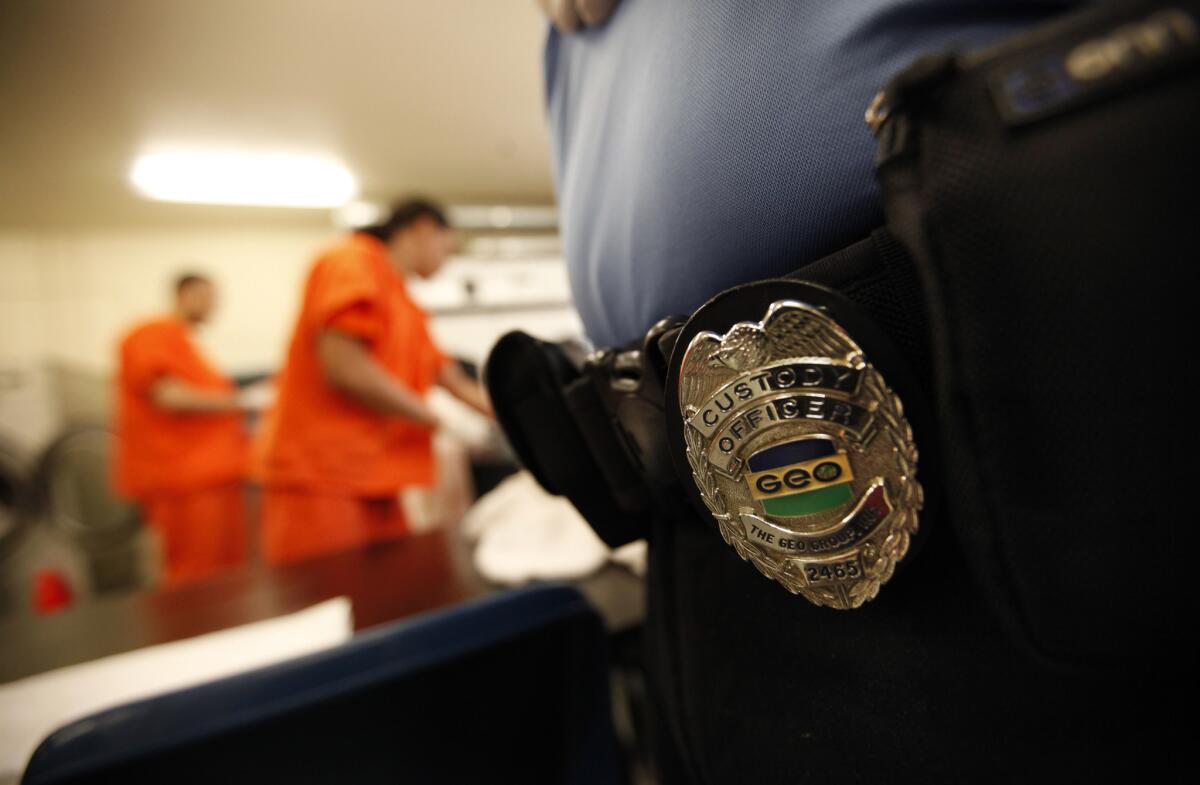Opinion: Judges should decide which deportation cases require detention

A guard watches inmates fold clothes at the Mesa Verde Detention Center, which opened in Bakersfield earlier this year to house up to 400 people awaiting deportation proceedings.
Federal appeals courts in California and New York City last week issued a couple of rulings that take significant – but insufficient – steps toward recognizing elemental human rights of non-citizens facing deportation.
Under federal law, people who have been convicted of any of a group of defined crimes are ineligible for admission to the country, and are subject to “mandatory detention” until they are deported. Others are detained by immigration officials for reasons that aren’t always clear.
But many of those same people may in fact be eligible for admission based on such reasonable grounds as incorrect or outdated records, or legitimate claims of asylum based on fears of persecution. Yet they also often remain in detention for months, in some cases years, before they get a chance to make their case to an immigration judge.
The two appellate rulings upheld lower court decisions that indefinite detentions pose constitutional problems, and, citing standards established in prior court rulings in unrelated cases, ordered the government to offer bond hearings to people detained for six months. But the 9th Circuit went one step further and ordered the government to offer a bond hearing every six months for those detained longer than a year.
Key here is that the decisions don’t tell the government to release from custody people who are considered dangerous or pose a threat to national security, or are a likely flight risk. The courts told the government that its immigration officials can’t make that call themselves – such a decision has to be made by a judge, as in, court review of governmental actions that deny people their liberty.
This reflects a basic American value. I just wish the courts went a little further and required bond hearings much earlier in the detentions. What is the right length of time? That’s unclear, but as the plaintiff in the New York case evidences, a lot of damage can be done even from short but unnecessary detentions.
In that case, Alexander Lora, a lawful permanent resident who moved to New York from the Dominican Republic as a child, had served three years of a five-year probation on cocaine possession-related charges when Immigration and Customs Enforcement agents arrested him in Brooklyn in 2013. Lora eventually won a bond hearing and was released on $5,000 bail five and a half months after he was detained. By then, Lora had lost his construction job, and his infant son had been placed in the foster care system. He has also since had his conviction reduced to a misdemeanor, which may help his argument that he shouldn’t be deported.
Lora still has not had his immigration hearing – that may not come until 2018 – so it’s unclear whether he’ll be able to stay or will be deported (he has a new job and recovered custody of his son). Drug use is a deportable offense, but the decision will be made by the immigration law judge, who is allowed to weigh mitigating factors, which is how the system should work.
But there is no reason to keep someone like Lora locked up indefinitely during that process – especially given the abysmally slow rate of adjudication of these cases, delays that are rooted in Congress’ failure to properly fund the immigration courts to handle the caseload. At the end of September, 456,000 cases were pending for an average of 643 days, with new cases being added daily, according to statistics compiled by the Transactional Records Access Clearinghouse at Syracuse University.
At any given time the government holds in detention centers (many of them privately operated) about 34,000 people facing deportation, a number driven by a bizarre congressional mandate that the Department of Homeland Security fill that many beds each night, not necessarily because a potential deportee’s circumstances indicate a need for detention. As Judge Barrington D. Parker wrote in the 2nd Circuit Court’s decision:
“No doubt an appreciable number of these detainees have criminal records that subject them to mandatory deportation. Many in this group are dangerous or have no ties to a community. Congress was quite clear that it wanted such individuals detained pending deportation. On the other hand, this group includes non-citizens who, for a variety of individualized reasons, are not dangerous, have strong family and community ties, are not flight risks and may have meritorious defenses to deportation at such time as they are able to present them.”
The New York decision parallels an earlier one by the 9th Circuit Court of Appeals, which last week not only affirmed its 2013 ruling that detainees are entitled to bond hearings, but expanded it to require the government to seek bond hearings every six months for people who were initially denied bond by an immigration judge. And it said the judge should consider the length of the detention in determining whether the person should continue to be held.
That seems reasonable, but it really isn’t. Yes, Congress made it the law that specific classes of people facing deportation must be detained until the process is complete. But that flies in the face of our perception of when the government has the right to deprive someone of his freedom. Such decisions should not be in the hands of administrative officials without judicial review, whether the underlying issue is violation of civil immigration laws or criminal statutes.
Follow Scott Martelle on Twitter @smartelle.
More to Read
A cure for the common opinion
Get thought-provoking perspectives with our weekly newsletter.
You may occasionally receive promotional content from the Los Angeles Times.







